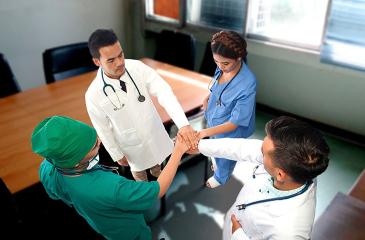Experiential Interprofessional Education Program Helps Prepare Medical Laboratory Scientists to Work in Collaborative Teams
This past summer, Mariah Witt, BS, MMLS ’21, a medical laboratory sciences student with the Center for Allied Health Programs, participated in the creation of a student-driven Experiential Interprofessional Education (IPE) pilot program as part of her internship with the Office of Academic Clinical Affairs.
After supporting the IPE pilot launch, Witt was able to benefit as a participant. For her interprofessional experience, she was paired up with a speech language pathology student.
“We knew little about each other’s career choice and this opened up our minds to how much knowledge is out there and its importance to patients,” said Witt.
A collaborative focus
Witt and two other interns contributed to the design of an online site offering a toolkit of structured IPE activities for learners to complete virtually during full-time rotations.
“The IPEs are designed to help learners see connections to each other even if they are not providing direct patient care side-by-side,” said Sara North, PT, DPT, MEd, co-director of the University’s Center for Interprofessional Health. “We’re thrilled to have medical laboratory scientists represented as they are a critical part of the care team in a patient- and community-centered model. Pairing these students with other health care providers helps increase the awareness of the MLS profession.”
A profession in high demand
The University’s Medical Laboratory Sciences program offers Minnesota’s only accredited four-year baccalaureate degree program in a public institution. Graduates from the program are in high demand with a job placement rate of 100 percent, according to Janice Conway-Klaassen, PhD, MLS, professor and director of the Medical Laboratory Sciences Program.
Medical laboratory scientists play a key role in the health care team by empowering health care professionals to effectively diagnose, treat and manage health. Approximately 70 percent of medical decisions, diagnoses, treatments and evaluations are based on the laboratory interpretive skills possessed by the program’s graduates.
“Typically, our MLS students are offered positions before they graduate,” said Conway. “The field is also experiencing a shortage across the nation as the demand for medical laboratory scientists has increased with expanding testing methods, increased laboratory usage by aging baby boomers, patients and staff retirements.”
The University’s program is also known for its diverse student body, first-generation college students and its reputation for educating future leaders in the medical laboratory sciences field.
“Our program is more advanced than many other programs and that puts a responsibility on us to provide a range of skillsets in our graduates,” said Conway-Klaassen. “Because of the MLS Program’s strong scientific background, our graduates are well prepared to advance their careers through additional education in graduate and medical professional schools.”
In 2022, the University’s MLS program will celebrate its 100th anniversary—the oldest baccalaureate program in the country.
“Our program has such a strong foundation in the basic sciences,” said Conway-Klaassen. “And our graduates have many choices for what they want to do after they complete their MLS degree.”
|
Lessons learned from the IPE pilot
|



